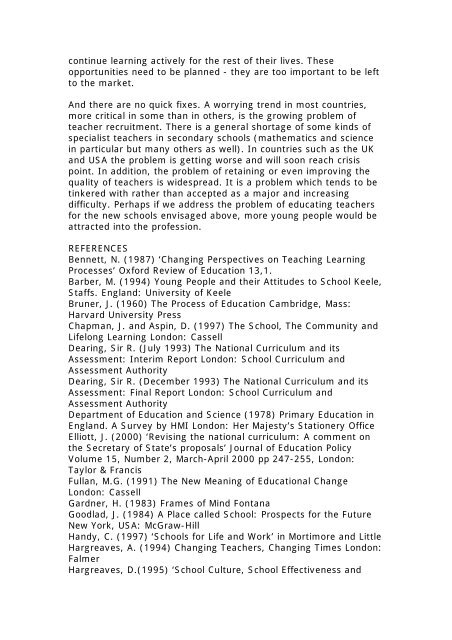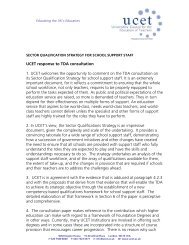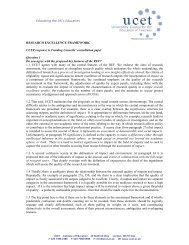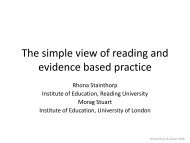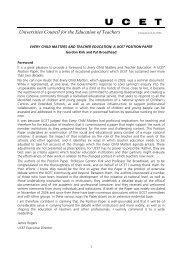The School Curriculum Ten Years Hence - UCET: Universities ...
The School Curriculum Ten Years Hence - UCET: Universities ...
The School Curriculum Ten Years Hence - UCET: Universities ...
You also want an ePaper? Increase the reach of your titles
YUMPU automatically turns print PDFs into web optimized ePapers that Google loves.
continue learning actively for the rest of their lives. <strong>The</strong>se<br />
opportunities need to be planned - they are too important to be left<br />
to the market.<br />
And there are no quick fixes. A worrying trend in most countries,<br />
more critical in some than in others, is the growing problem of<br />
teacher recruitment. <strong>The</strong>re is a general shortage of some kinds of<br />
specialist teachers in secondary schools (mathematics and science<br />
in particular but many others as well). In countries such as the UK<br />
and USA the problem is getting worse and will soon reach crisis<br />
point. In addition, the problem of retaining or even improving the<br />
quality of teachers is widespread. It is a problem which tends to be<br />
tinkered with rather than accepted as a major and increasing<br />
difficulty. Perhaps if we address the problem of educating teachers<br />
for the new schools envisaged above, more young people would be<br />
attracted into the profession.<br />
REFERENCES<br />
Bennett, N. (1987) ‘Changing Perspectives on Teaching Learning<br />
Processes’ Oxford Review of Education 13,1.<br />
Barber, M. (1994) Young People and their Attitudes to <strong>School</strong> Keele,<br />
Staffs. England: University of Keele<br />
Bruner, J. (1960) <strong>The</strong> Process of Education Cambridge, Mass:<br />
Harvard University Press<br />
Chapman, J. and Aspin, D. (1997) <strong>The</strong> <strong>School</strong>, <strong>The</strong> Community and<br />
Lifelong Learning London: Cassell<br />
Dearing, Sir R. (July 1993) <strong>The</strong> National <strong>Curriculum</strong> and its<br />
Assessment: Interim Report London: <strong>School</strong> <strong>Curriculum</strong> and<br />
Assessment Authority<br />
Dearing, Sir R. (December 1993) <strong>The</strong> National <strong>Curriculum</strong> and its<br />
Assessment: Final Report London: <strong>School</strong> <strong>Curriculum</strong> and<br />
Assessment Authority<br />
Department of Education and Science (1978) Primary Education in<br />
England. A Survey by HMI London: Her Majesty’s Stationery Office<br />
Elliott, J. (2000) ‘Revising the national curriculum: A comment on<br />
the Secretary of State’s proposals’ Journal of Education Policy<br />
Volume 15, Number 2, March-April 2000 pp 247-255, London:<br />
Taylor & Francis<br />
Fullan, M.G. (1991) <strong>The</strong> New Meaning of Educational Change<br />
London: Cassell<br />
Gardner, H. (1983) Frames of Mind Fontana<br />
Goodlad, J. (1984) A Place called <strong>School</strong>: Prospects for the Future<br />
New York, USA: McGraw-Hill<br />
Handy, C. (1997) ‘<strong>School</strong>s for Life and Work’ in Mortimore and Little<br />
Hargreaves, A. (1994) Changing Teachers, Changing Times London:<br />
Falmer<br />
Hargreaves, D.(1995) ‘<strong>School</strong> Culture, <strong>School</strong> Effectiveness and


